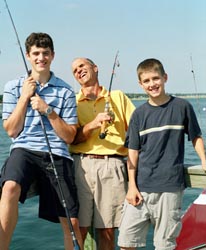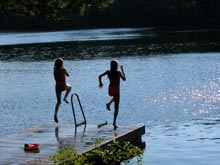How to Keep Your Kid’s Mind Active This Summer…
and Why You Should
by www.SixWise.com
Summer vacation -- a little over two months of free time and fun for your kids -- but that doesn’t mean they should lose everything they learned over the school year.
|

If your kids don’t keep their minds active over the summer, they can lose 2.6 months of grade level equivalency in math skills and nearly a whole reading level!
|
The long, lazy days of summer pose a risk for school-aged children and it’s even been coined as “summer brain drain.” Research has shown that if your child’s brain remains stagnant without challenge over the summer months, they could lose, on average, 2.6 months of grade level equivalency in math skills and nearly a whole reading level.
Other studies have shown that on the average students will score lower on standardized tests at the end of summer vacation compared to the same tests they took at the beginning of the summer.
Parents can make a big difference in the knowledge their kids retain by setting examples and acting as positive role models. Doing by example is one of the most effective ways to motivate children to want to lead a healthy, active lifestyle.
Modeling Healthy Behavior for Your Kids
If you want your kids off the couch and away from the TV and instead to remain active intellectually and physically, then show them the way by exposing them to alternative extracurricular activities.
“Children learn by imitation,” said Maria Antonia Pinon, director of the All Aboard Family Literacy Program at Miami’s non-profit institute for Child and Family Health, in The Miami Herald. “If mom or dad reads, the child is going to follow suit. And if the child can’t read, read to him. Any kind of learning, when attached to love, will create a habit.”
Strong reading skills are the basis of any good education, so whenever you get the chance, encourage your children to read. Other creative ways to plant the seed for the love of reading include summer reading programs offered through local libraries, story hour at bookstores and summer book clubs. Book clubs also are a great way to learn goal setting through personal reading goals and even offer rewards and surprises for top readers.
If your kids see you exercising and engaging in sports or other physical activities, they are likely to follow in your footsteps as well.
“A parent’s active lifestyle is a powerful stimulus for a child,” said Edward Laskowski, M.D., a specialist in physical medicine and rehabilitation and co-director of the Sports Medicine Center at Mayo Clinic, Rochester, Minn., on MayoClinic.com. “You are a role model for your children; set a good example by making physical activity a priority in your life.”
|

A trip to the lakefront or beach is a great way to keep kids active while enjoying the long days of summer.
|
Cooking up Some Family Fun
You don’t have to change summer into school time, but you can keep your kids from losing what they’ve learned in school by making small changes to their everyday outlook on life. Simple everyday activities at home can be turned into learning opportunities for your kids.
- Visualize your kitchen as a math lab by asking your child to assist you with cooking and baking recipes. Measuring and figuring out fractions can be turned into kitchen fun. For example, ask your child how many pints are in a quart or have them find a recipe in a cookbook to cook for the entire family where they have to double or triple the recipe.
- Turn cooking into a game by asking: How many pints are in a quart or how many ounces equal one cup?
- Take your kids grocery shopping and challenge them to find a meal or dinner idea to feed the whole family for $15.
Make Physical Activity a Priority in Your Household
Another reason to keep your kids active over the summer is to prevent weight gain. No school, no homework and no routines equals a lot of downtime and more time for kids to eat whenever they want, which results in extra pounds.
“Summertime is actually a bad time as far as weight goes for kids,” said Dr. Denise Edwards, assistant professor of internal medicine and pediatrics and director of the University of South Florida’s Healthy Weight Clinic, in the St. Petersburg Times. “I thought summer would be better because they could be more active, but it’s usually the opposite. They’re not on a set schedule so they can eat all the time. They’re not as active as you’d expect because it’s hot. So kids end up gaining weight.”
Parents could increase their kid’s activity levels by establishing some summer guidelines. By following some of these guidelines, your kids will develop an appreciation for activities that nourish their mind and body.
-
Limit TV time, including video games and computer time to one or two hours a day and stick to it! Along with this, consider curtailing the amount of time text messaging or chatting on the phone.
-
Make physical activity a part of your kid’s daily schedule. Start with small activities such as getting up early and walking the dog or going for a walk together after dinner.
-
Set aside family discussions where each child takes a turn coming up with an activity of the week such as going to the batting cages, bowling or playing miniature golf.
-
For your next child’s birthday party, consider having a picnic in the park and hike through the woods, a roller-skating party or visiting the local YMCA with a climbing wall or nearest neighborhood jungle gym.
-
Explore new bike trails with your kids.
-
Ask your child to help out with chores such as washing the car or mowing the lawn.
-
Take a trip to the park with a Frisbee, football or a kite.
Finding and Sparking Your Kid’s Individual Interests
“Focus on the child’s specific interest, too. Does he like the outdoors? Plant a vegetable garden, and use that as an opening to discuss nature,” Debbie Mandel, a New York-based talk-show host and author who often writes about stress, told The Miami Herald. “Is she into music? Encourage her to write original lyrics to a song, and then videotape her performing it. It’s an excellent way to practice writing.”
Experts offer other suggestions to incorporating academics into summer fun:
- Research and then visit special-interest camps
Get opinions from other children and parents that have first-hand experience with the camps. Ask in-depth questions such as, does it offer an enriching experience or is it just glorified babysitting?
- Spice up Your Summer Family Vacation with History
Add an educational theme to your vacation. Once you’ve decided on a particular state or destination, look up national parks in the area or historical sites and then take the kids on a geological or historical tour led by a ranger. Or pick up a book or travel guide on where you’re going before you leave.
During the trip play the game, “I Spy” to search road signs for numbers, colors and geometric shapes. Show your child a map of your destination and ask for help with plotting the trip and estimating the miles based on the map key.
- Plan day trips to the zoo or local museum.
These places offer educational programs with fun learning activities.
- Join a local pool or organized sport
These are great ways for your kids to make friends, build their confidence and stay fit while having fun.
Recommended Reading
The Healthiest States & The Unhealthiest States for Children in the USA: New Rankings
Parents Don't Even Recognize Their Children are Obese
Sources
The Miami Herald May 23, 2009
Tampabay.com May 21, 2009
Associated Content March 12, 2007
MayoClinic.com
The Sacramento Bee June 2, 2009